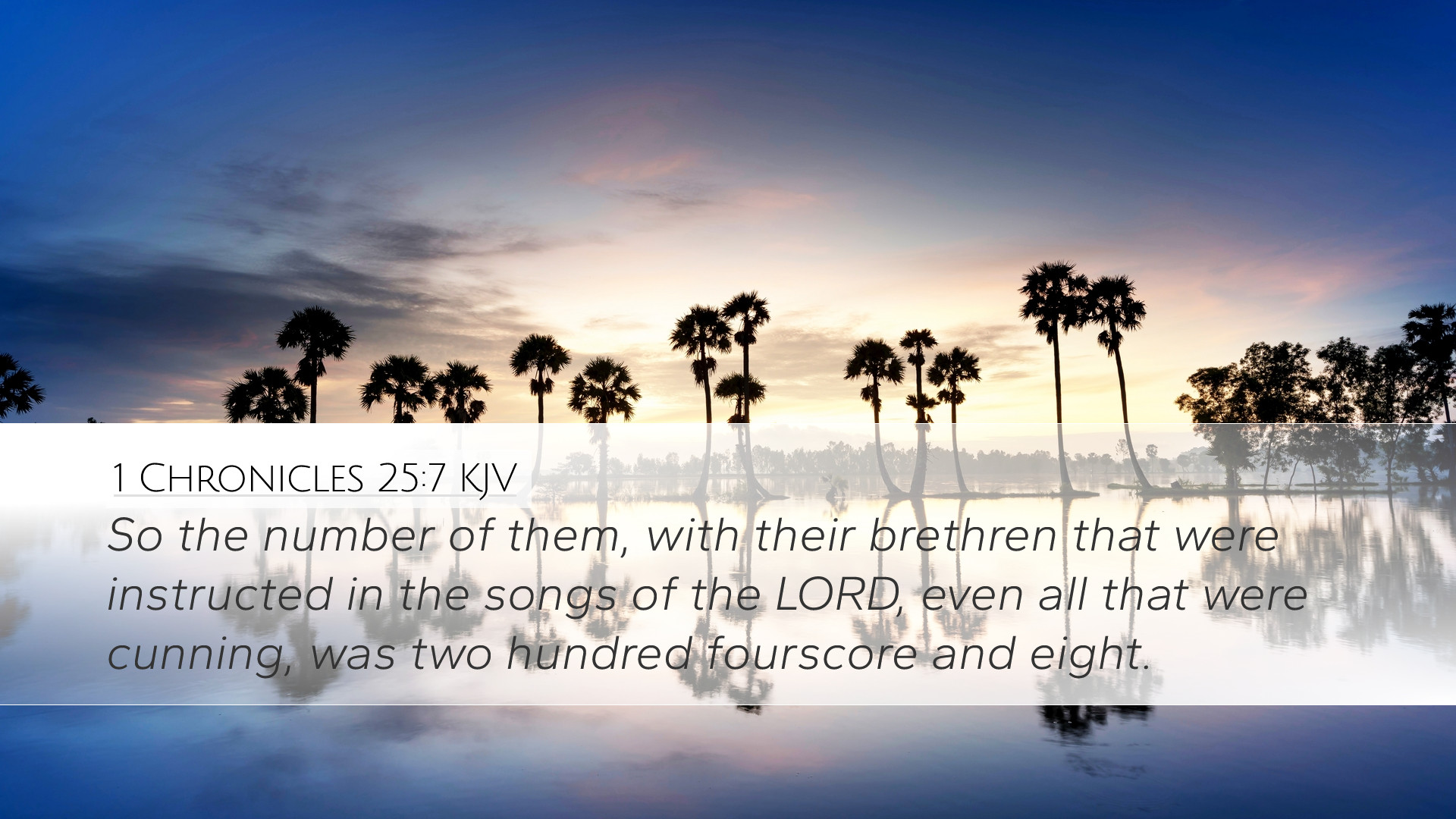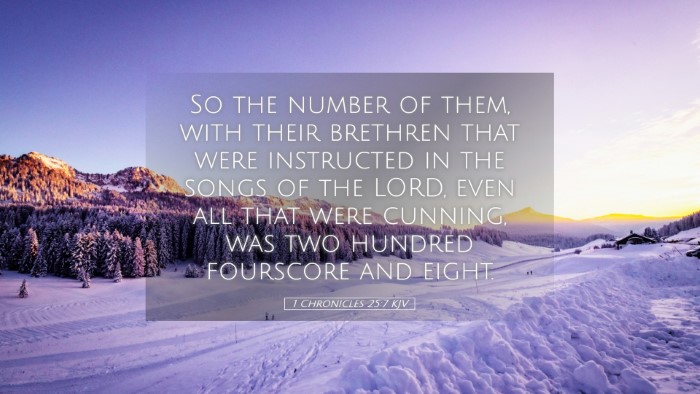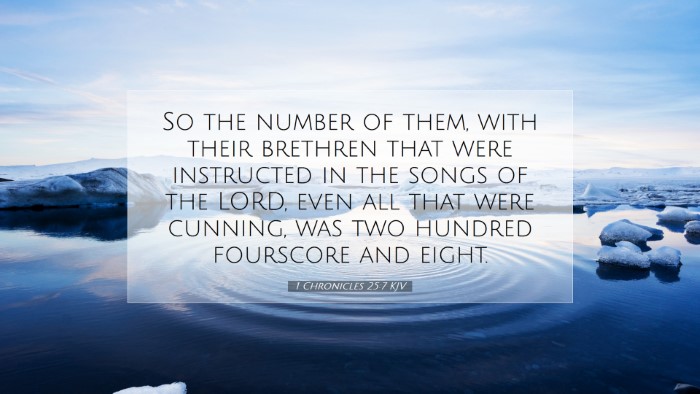Commentary on 1 Chronicles 25:7
Verse: "So the number of them, with their brethren that were instructed in the songs of the Lord, even all that were cunning, was two hundred fourscore and eight." (1 Chronicles 25:7)
Introduction
The verse from 1 Chronicles 25:7 is a vital passage that emphasizes the organization and the importance of music in worship during the time of King David. It provides insight into the role of musicians and the structure of the Levite ministry. This commentary aims to explore the historical context, significance, and implications of this verse through insights gleaned from distinguished public domain commentaries.
Historical Context
In the context of the Old Testament, particularly in the books of Chronicles, the author provides a historical account of Israel's worship practices. The genealogies and duties of the Levites, including musicians, underscore the reverence for the service of God. Music played a crucial role in the Hebrew religious experience, serving both as a form of praise to God and as a means of instruction for the people.
David's organization of the worship system reflects his heart for God and his desire to promote worship within the community. As Matthew Henry notes, "the ordering of these matters was a point of great consequence."
Insights from Matthew Henry
Henry emphasizes the importance of skill and proficiency in the art of music for the Levites assigned to this sacred task. He remarks on how this proficiency was essential for leading the congregation into true worship. The number "two hundred fourscore and eight" (288) denotes a significant and organized group, demonstrating the seriousness of musical ministry. Each musician was not simply filling a position but was chosen based on their divine calling and capability.
This multitude of skilled musicians indicates that God desires excellence in worship, inviting the faithful to bring their best offerings to Him. The role of music, as Henry elucidates, is not merely to entertain but to facilitate worship and convey theological truths.
Albert Barnes' Perspective
Albert Barnes offers a more detailed examination of the term "cunning," interpreting it as denoting the idea of being skillful or experienced in the craft of music. He stresses that such skill was not incidental but rather an integral part of leading others in worship. Barnes points out that the musicians were not limited to simply performing; rather, they were teachers of the "songs of the Lord."
This teaching aspect suggests a dual role where music served both as an expression of worship and an educational tool for instructing the people in God's ways. Barnes highlights that this practice reflects the importance of Scripture memorization and the embedding of God's truth within the community through the medium of music.
Adam Clarke's Interpretation
Adam Clarke provides a rich exegetical approach to understanding the structural aspect of worship through this verse. He notes that the number 288 was a symbolic representation of a well-ordered hierarchy within the worship ministry, hinting at the divine establishment and organization present in worship practices. Clarke underlines that worship was not haphazard; rather, it was a well-organized effort with clear purposes and roles.
Clarke also reflects on the spiritual implications of this organization, suggesting that spiritual order brings about effectiveness in worship and the outreach of God's message. His analysis encourages believers to see the structured worship that pleases God as a model for contemporary church practice.
Theological Significance
The passage reveals significant theological implications regarding worship and ministry:
- The Value of Worship: The presence of a large number of skilled musicians reflects the value placed on worship within the community. Music serves as a medium to express the reverence and adoration owed to God.
- Spiritual Gifts: The emphasis on skill and instruction reminds believers of the importance of utilizing God-given talents for His glory. Each person's abilities contribute to the edification of the church.
- The Role of Community: The collective nature of worship reinforces the idea that worship is not an individual activity but a communal experience that brings believers together in unity.
- The Importance of Teaching: The dual function of musicians as worship leaders and teachers of God's songs underlines the integral role of music in doctrinal instruction and spiritual growth.
Practical Applications for Worship Today
As we consider 1 Chronicles 25:7 in the context of modern worship settings, several practical applications emerge:
- Equipping Musicians: Churches should prioritize the training and development of musicians, encouraging them to grow in their craft, not only for excellence in performance but for deeper worship engagement.
- Creating Worship Communities: The role of music in community worship should be emphasized, fostering an environment where congregational singing is a priority, reflecting unity in faith and purpose.
- Education through Music: Incorporating theological themes into music can serve as a valuable teaching tool for the congregation, aiding in spiritual growth and understanding.
- Collegial Support: Collaboration among musicians, singers, and worship leaders can enhance worship experiences, utilizing diverse gifts to glorify God collectively.
Conclusion
The verse from 1 Chronicles 25:7 provides rich and deep insights into the significance of music in worship and the structured approach taken by David to facilitate this vital aspect of communal life. From the historical context to contemporary applications, the legacy of these Levites inspires modem believers to value excellence in worship and the use of music for teaching and edification. Through careful organization and skilled execution, the worship of God would rightly honor Him and cultivate faith among His people.


